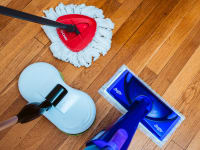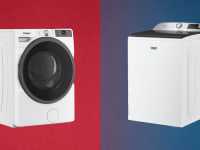You might be too clean—here's why science says to embrace germs
Step away from the hand sanitizer.
Products are chosen independently by our editors. Purchases made through our links may earn us a commission.
You use your dishwasher every night to sanitize dirty dishes (because hand-washing just won't cut it). You vacuum constantly so that your kid doesn't—gasp!—accidentally eat a speck of dirt. You apply hand sanitizer every time someone even breathes on you. To put it simply, you're obsessed with being clean.
But according to some experts, you may be too clean—and that's not a good thing. "For your immune system to protect you, it has to know the difference in what is dangerous and should be attacked and harmless substances that can be ignored," immunologist Dr. Eliza Chakravarty told The Oklahoman. “And to learn that, it needs to be exposed to some of the elements we’re erasing from the environment."
Here's why over-sanitizing could work against you, plus how to find that perfect balance of clean enough.
The negative effects of being too clean
Like Dr. Chakravarty explained, obsessing over sanitation can actually compromise your immune system. Our senior lab testing technician (and resident germ guru), Jonathan Chan, agrees—and has plenty of proof to back it up. "I think a great way to look at this is through the lens of allergies," he says. "Food allergies are on the rise (the UK alone has seen a five-fold increase in peanut allergies in the past 30 years) and one possible explanation is that children's immune systems aren't given enough practice to identify threats from non-threats."
He also adds, "A 2015 Swedish study showed that families that hand-washed their dishes rather than sanitized them in the dishwasher had children that were less likely to developed eczema, allergic asthma, and hay fever."
What the "hygiene hypothesis" is and why it's important
All of the research showing that too much sanitizing can lead to more infections and health issues supports what's known as the hygiene hypothesis. Essentially, it claims that a child's immune system has to be exposed to germs and bacteria in order to develop fully as the body needs to learn how to fight off invaders. Some scientists believe that a lack of exposure could be what's causing increases in allergies and autoimmune diseases.
How to be clean without going overboard
While there are no hard and fast rules, many experts—and Chan—advise to simply use your best judgment. "Looking at all the data, I think common sense rules the day here—let your kids get dirty from time to time," Chan says. "Yes, you should sanitize surfaces that have come in contact with raw meat and human fluids, but sanitizing your entire house is futile."
The takeaway? The CDC recommends basic sanitation practices, like washing your hands when it makes sense (like after you use the bathroom or before eating) and focusing your cleaning efforts on rooms like the bathroom and kitchen where you're likely to come into contact with bodily fluids and/or raw food.


